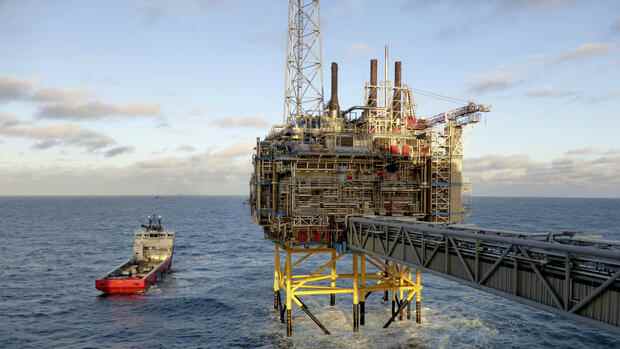Oslo Amid major concerns about Europe’s security of supply, Norwegian oil and gas workers have walked off the job to fight for higher wages. “The strike has started,” Lederne union chairman Audun Ingvartsen told Reuters on Tuesday. Measures could be expanded over the next few days, which could see the country’s gas production fall by almost a quarter.
As a result, prices rose on the commodity markets: the British wholesale price for gas for next-day delivery jumped a good 18 percent.
The Norwegian Ministry of Labor announced that it would follow the conflict “closely”: it can intervene and end a strike if there are exceptional circumstances. The members of the Lederne union, which represents around 15 percent of offshore workers, had rejected a collective agreement that had already been negotiated. The other unions, on the other hand, have accepted it and do not want to go on strike.
The industrial action began at midnight on three fields – Gudrun, Oseberg South and Oseberg East. From Wednesday it is to be extended to three more fields – Kristin, Heidrun and Aasta Hansteen. A seventh field, Tyrihans, must also be closed on Wednesday as its production is processed by Kristin.
Top jobs of the day
Find the best jobs now and
be notified by email.
As a result of the work stoppage on Tuesday, production will be cut by 89,000 barrels of oil equivalent per day, of which 27,500 are for gas production, said the Norwegian energy group Equinor. According to a Reuters calculation, a further planned escalation by Saturday could paralyze almost a quarter of Norwegian gas production and around 15 percent of oil production. “The consequences of this escalation are not yet clear,” Equinor admitted.
For the EU countries, the work stoppage comes at an inopportune time, as they are dependent on more gas from Norway due to a lack of Russian supplies. Both sides want to intensify cooperation in order to ensure additional gas supplies from Norway in the short and long term, the EU and Western Europe’s largest gas producer announced at the end of June. For example, Russia has stopped deliveries to Poland and the Netherlands, among others, because these countries have rejected the new payment methods in rubles introduced by the government in Moscow.
Due to the supply cuts, Norway has already ramped up its gas production and said it will increase its sales by eight percent this year. The EU has so far imported around 20 percent of its gas from Norway. Around 40 percent came from Russia before the Russian invasion of Ukraine on February 24.
More: Norway’s energy group Equinor: “We deliver as much gas as possible”

